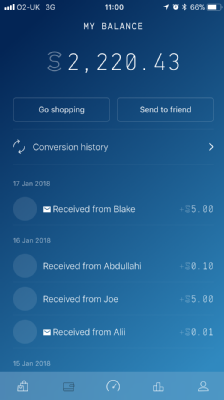Unfit people are more physically active because of Sweatcoin the app that pays you to walk
· Academics from the Institute of Digital Healthcare, WMG at the University of Warwick found that users of the app on average increased their daily step count by nearly 20% over 6-months.
· People who were classified as less physically active and overweight were most likely to increase their daily step count when using the app.
· They aim to get more people up and walking outside to improve levels of physical activity.
More people are physically active due to the Sweatcoin app which rewards you for walking – researchers at the Institute of Digital Healthcare, WMG at the University of Warwick have found. Sweatcoin gets people  outdoors and walking to earn a virtual currency to spend in their marketplace.
outdoors and walking to earn a virtual currency to spend in their marketplace.
Reaching your target number of steps a day is a little easier for those using the app called Sweatcoin which rewards users with a virtual currency for walking.
Sweatcoin works by converting the number of steps recorded on your phone into a virtual currency of Sweatcoins.
Every 1,000 steps generate 0.95 Sweatcoins and these can be used to purchase products on the in-app marketplace, (with prices ranging from 5 to 20,000 Sweatcoins), in local shops, or be transferred between other users.
Currently, steps recorded outdoors are rewarded due to the use of a GPS-based verification algorithm used to stop people cheating their phone’s step-counting algorithm.
The Institute of Digital Healthcare, WMG at the University of Warwick analysed daily step count data from 6000 users of the app, and found that there was a sustained average increase of nearly 20% in daily step count over a 6-month period after users had registered with the app, in comparison with a 3-month period prior to downloading the app.
Following a survey on a sample of the original 6000 users, those who were classified as less physically active and overweight were found to be most likely to increase their daily step count when using the app, meaning that Sweatcoin was having impact on an important section of the population who previously had low levels of physical activity.
Dr Mark Elliott, Assistant Professor at the Institute of Digital Healthcare, WMG - University of Warwick comments:
“We were delighted to have the opportunity to work with Sweatcoin and investigate how their app impacts on physical activity behaviour change. By analysing the daily step count data from a sample of Sweatcoin users and combining this with data from the surveys and focus groups facilitated by our researchers, we were able to identify which types of user had shown the biggest change in terms of increased physical activity from using the app.”
Anton Derlyatka co-founder at Sweatcoin comments:
"Incentivising people to walk more is key to improving levels of sustained physical activity. Yet, traditional ideas such as providing educational seminars or discounted gym passes, just don’t deliver. The University of Warwick found that an economy built on movement, as created by Sweatcoin, establishes sustained motivation for people to be more active. For an increasingly sedentary population facing an obesity and wellness crisis, these are significant findings.”
Lord Philip Hunt, Sweatcoin Advisory board member commented:
“Most health apps and initiatives tend to be aimed at those who are already active. Sweatcoin has huge potential in encouraging and incentivising non-active people to get walking. Given the health gains that can be achieved through increased physical activity, this is the kind of breakthrough we need to help motivate who can benefit most.”
ENDS
22 JANUARY 2019
NOTES TO EDITORS
High-res images available at:
https://warwick.ac.uk/services/communications/medialibrary/images/january2019/shutterstock_1117356jpg719.jpg
https://warwick.ac.uk/services/communications/medialibrary/images/january2019/shutterstock_363839462.jpg
https://warwick.ac.uk/services/communications/medialibrary/images/january2019/sweatcoin_balance.png
https://warwick.ac.uk/services/communications/medialibrary/images/january2019/sweatcoin-member-page.png
https://warwick.ac.uk/services/communications/medialibrary/images/january2019/sweatcoin-offers-page.png
Credit all to Sweatcoin
ABOUT WMG:
WMG is a world leading research and education group and an academic department of the University of Warwick, established by Professor Lord Kumar Bhattacharyya in 1980 in order to reinvigorate UK manufacturing through the application of cutting edge research and effective knowledge transfer.
WMG has pioneered an international model for working with industry, commerce and public sectors and holds a unique position between academia and industry. The Group’s strength is to provide companies with the opportunity to gain a competitive edge by understanding a company’s strategy and working in partnership with them to create, through multidisciplinary research, ground-breaking products, processes and services.
Every year WMG provides education and training to schoolchildren through to senior executives. There is a growing part-time undergraduate programme for apprentices, as well as full-time undergraduates. The postgraduate programmes have over 2,000 students, in the UK and through centres in China, Singapore, Thailand, Malaysia and Cyprus
For more information visit www.wmg.warwick.ac.uk
For further information please contact:
Alice Scott
Media Relations Manager- Science, University of Warwick
Tel: +44 (0) 2476 573 255 or +44 (0) 7921 531 221
E-mail: alice.j.scott@warwick.ac.uk
For further information please contact:
Alice Scott
Media Relations Manager- Science, University of Warwick
Tel: +44 (0) 2476 573 255 or +44 (0) 7921 531 221
E-mail: alice dot j dot scott at warwick dot ac dot uk
